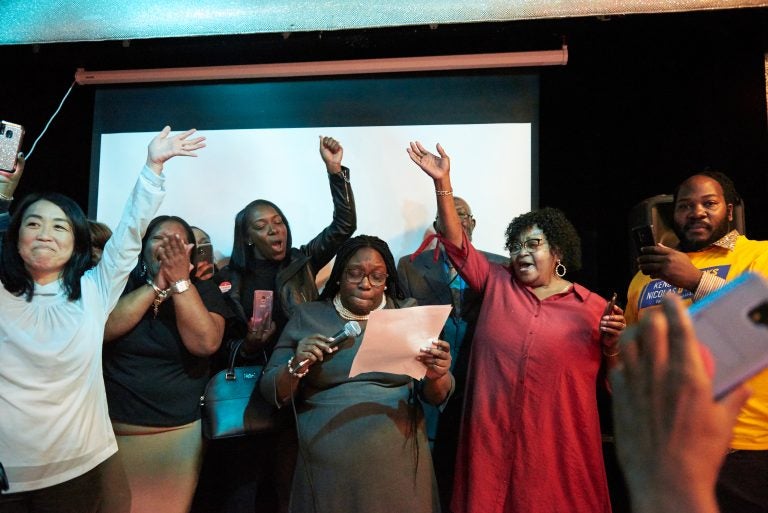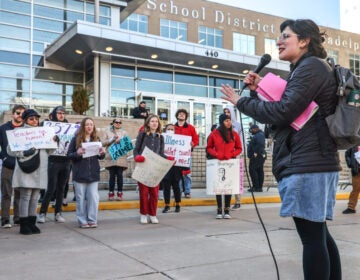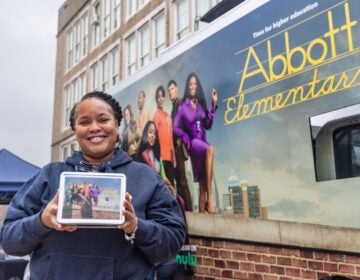With insurgent Brooks joining Gym on council, what’s next for public education in Philly?
For the second time in as many city elections, Philadelphians have elected an education activist to Council. What does that mean for the city’s education landscape?
Listen 2:05
Kendra Brooks at her victory party on Nov. 5 in North Philadelphia. (Natalie Piserchio for WHYY)
Shakeda Gaines met Councilmember-elect Kendra Brooks back in 2014 when they were both parent advocates fighting the spread of standardized tests.
Fellow parent Tonya Bah was in the trenches with them, shoulder-to-shoulder with longtime education rabble-rouser Helen Gym.
“We all were just regular parents just wanting something different for our children,” Gaines recalled.
A lot has changed for the quartet since then.
Gaines is the president of the Philadelphia Home and School Council. Bah has become a regular presence at school board meetings and ran a campaign for City Council this past spring. Gym went a step further, capturing an at-large council seat in 2015 and vaulting into bonafide mayoral contender status with a dominant showing in her re-election campaign this year.
Now comes Brooks, who on Tuesday won her own City Council seat and became the first candidate in generations to break the two-party hold on Philly government.
“I’m so proud of her,” Gaines said. “And I’m proud of the movement.”
For the second time in as many city elections, an insurgent candidate has emerged from the world of public education activism and surged into a citywide office. What was once the realm of outsiders now looks like a legitimate springboard to political power.
Labels can be tricky here. Some would call Brooks and Gym opponents of education reform or anti-charter advocates. Others would say they represent the interests of traditional public schools or are opponents of school privatization.
What’s clear is that they came from the same coalition of left-leaning education activists — activists who’ve now shown, twice, that they are numerous enough to lift their preferred candidate into Philadelphia City Council.
Bah says the consecutive victories of Gym and Brooks show that it’s time to “throw out the rule book” when it comes to who can win political office in Philadelphia.
Gym had been a prominent activist for more than a decade when she won her City Council seat. She also enjoyed strong backing from the city’s teacher’s union during her run.
Brooks didn’t need that much time — or that kind of institutional support.
Though Gym backed Brooks, the teachers’ union didn’t. And Brooks only emerged as a prominent education voice about five years ago.
Back in 2014, Brooks led parent opposition of a plan that would have turned her local elementary school in Nicetown into a charter school. That school, Edward T. Steel, stayed in district hands, and Brooks moved on to other advocacy work.
She helped heap pressure on the School Reform Commission (SRC), part of a coalition that ultimately convinced the state-controlled board to dissolve itself. Mayor Jim Kenney then chose Brooks to serve on the nominating panel that helped pick the new local school board, which replaced the defunct SRC.
Now Brooks is one of 17 City Council members and a potential force in the legislative body’s push leftward.
So what does all that mean for education politics in Philadelphia over the next four years?
Brooks is likely another “yes” vote for more school funding and another voice in the call to repeal Philadelphia’s 10-year property tax abatement. But one vote can only go so far.
In Gym’s four years on City Council, legislators have yet to take action on the controversial abatement. And while they’ve boosted funding local schools, they rejected Gym’s and Mayor Jim Kenney’s call to boost funding further with a property-tax hike.
Will Brooks tip the voting math on those or other education issues? It’s hard to know.
What’s more likely — at least in the immediate future — is that Brooks will follow Gym’s lead by using her new platform to amplify a lot of the positions and talking points favored by traditional education activists.
“We’ve been in the room because of Helen,” Bah said. “But we are in the room holding a microphone because of Helen and Kendra together.”
Gym used her bully pulpit frequently over the last four years to highlight systemic education issues: everything from crumbling school infrastructure to the lack of music teachers to staffing shortages to the plight of homeless youth. And that’s a partial list.
Supporters see Brooks as another person who will hold education officials to account and shed sunlight in needed places.
“We get to see the things that people have been hiding from us,” said Shakeda Gaines.
However, there will be some limits to what Brooks, Gym and their allies can accomplish in the short term.
The mayor still has ultimate control over who serves on the school board. And the board has ultimate control over the school district’s operations.
A new voice on City Council is unlikely to produce major changes in how the School District of Philadelphia operates day-to-day, or in district leadership. Nor is Brooks in position to radically reshape the number of students who attend Philadelphia’s charter schools, which are governed by school district policy and state law.
Could someone like Brooks or Gym — a charter skeptic with an education background — ascend to the mayor’s office? Could they be in a position to reshape the district’s school board and, by extension, district policy?
That’s what’s on the mind of David Hardy, executive director of Excellent Schools PA and a school-choice advocate.
“I think what people are doing is getting geared up for the next mayoral election,” Hardy said.
Winning a citywide council race and winning a mayoral campaign are very different propositions.
The former requires building a voter bloc that can stand out in a crowded and fractured field. The latter requires a wider base of support. (Brooks, for reference, was only on about 20% of the ballots filed Tuesday, as of the latest count.)
There may be a robust (and unified) plurality of voters who support the kind of charter skepticism that Gym and Brooks espouse.
Charters on the whole, however, remain popular in Philadelphia — as indicated by polls and long waiting lists to enroll in them.
Hardy says charter school backers clearly have to refine their message and harness the power of parents who support school choice.
“This was a wake-up moment for our side,” he said.
(It is worth noting that former charter school dean Isaiah Thomas also won an at-large council seat on Tuesday, as well.)
Not all charter advocates, however, are lamenting Brooks’ historic win. Former SRC member Sylvia Simms backed Brooks’ run and called her fellow North Philadelphia mom a “friend.”
Though Simms is a passionate school choice advocate, she said she admires Brooks’ commitment to education. Simms hopes Brooks and Gym will combine to hold district decision-makers accountable in a way they haven’t always been.
Simms sees Brooks’ ascent less as a rejection of school choice and more a reflection that people want grassroots activists in positions of power — especially when it comes to the city’s education system.
“I think people are just getting sick and tired of things being the way they used to be,” Simms said. “And they want change.”
WHYY is your source for fact-based, in-depth journalism and information. As a nonprofit organization, we rely on financial support from readers like you. Please give today.





